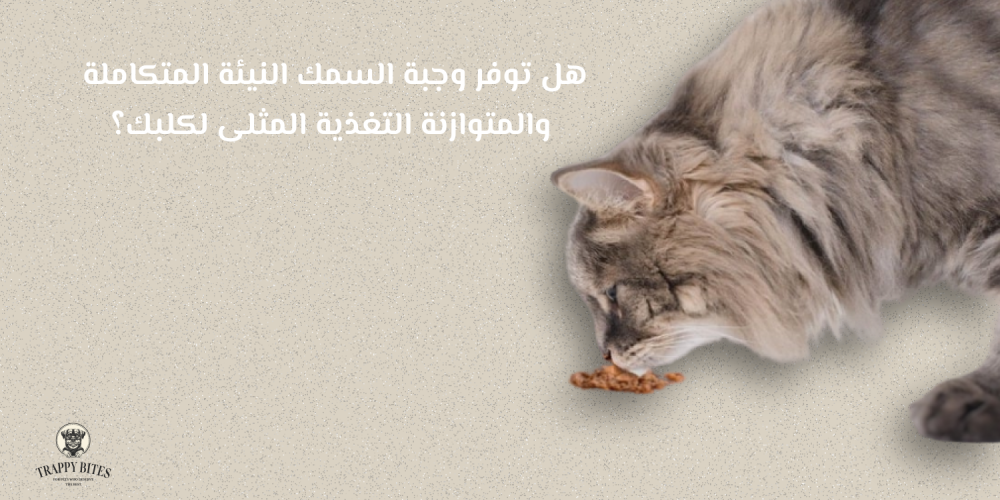Providing a healthy diet for your pet ensures a long and healthy life. Many breeders are looking for the best meals for cats and dogs that provide an ideal nutritional balance, especially with the increasing interest in natural foods such as raw fish meals. However, not every cat food or dog food is suitable for all animals. Therefore, it is important to choose meals for cats and dogs that meet their nutritional needs in a complete and safe manner. In this article, we will discuss the benefits and risks of providing raw fish meals to dogs, while presenting the best alternatives to ensure ideal nutrition.
Benefits of raw fish meal for dogs and its impact on their health
Fish meal is a nutritional choice rich in proteins, omega-3 acids, and vitamins that contribute to promoting the health of dogs. However, as is the case with the best meals for cats The success of a diet depends on the balance between different nutrients.
Benefits of Feeding Raw Fish to Dogs
- Improve skin and coat health : Fish contains omega-3 fatty acids, which enhance the shine of the coat and reduce skin inflammation, which is beneficial for dogs as it is important in the favorite meals of cats.
- Strengthening immunity and the digestive system : Fish is full of minerals and vitamins that boost dogs' immunity and keep their digestive system healthy.
- Improve Heart and Joint Health : Fatty acids reduce inflammation and support heart and joint health, and they also help promote the health of cats who rely on a nutrient-rich cat food.
- Strengthening bones and teeth : Fish are rich in calcium and phosphorus, which are two essential elements for bone growth and strengthening.
Despite these benefits, fish alone cannot be relied upon as a complete diet, but must be part of a balanced nutritional plan, as is the case with the best meals for cats.
Potential Risks of Feeding Raw Fish to Dogs
While fish meal provides important nutritional benefits, there are some risks to be aware of, just as there are when choosing your cat's favorite meals.
These potential risks include:
- Mercury poisoning : Some fish, such as tuna, contain high levels of mercury, which can be as harmful to dogs as it is to cats who eat cat food rich in fish.
- Parasites and bacteria : Raw fish may contain dangerous parasites that can cause intestinal diseases.
- Digestive disorders : Some dogs may be allergic to marine proteins, causing digestive disorders.
- Presence of small bones : Fish with small bones can pose a danger to dogs by blocking the digestive tract or causing internal wounds.
To protect your dog, it is recommended to serve fish cooked or frozen before serving, the same precautions you should take when preparing meat for cats.
Balanced food alternatives for dogs
When looking for balanced food options for your dog, it is essential to consider alternatives that provide the same nutritional value as a raw fish meal but without the potential risks. The best cat meals rely on a variety of sources of protein, vitamins, and healthy fats to ensure optimal health for your pet.
The most important food alternatives for dogs
- Fresh meat: Meat is an excellent source of protein, and cats can be given cooked chicken or beef as a complete protein source.
- Balanced cat food Some high-quality commercial cat foods contain proteins and healthy fats that can be a nutritional alternative for dogs as well.
- Favorite meals for cats and dogs : Some specialized brands provide balanced nutritional options that can be given to dogs, making them an ideal choice for maintaining the animal's health.
- Natural fruits and vegetables : Adding fruits and vegetables to the diet helps improve digestion and provides essential vitamins and minerals.
- Natural food supplements : such as fish oil, which can be added to food to obtain the benefits of Omega 3 without the need to provide a direct raw fish meal .
Choosing the best meals for cats Dogs are essential to ensure optimal nutrition, as one meal alone may not provide all the required nutrients. Therefore, a combination of proteins, vegetables and supplements should be used to ensure balanced health for your dog.
How to Choose the Perfect Diet for Your Dog
Just as when choosing the best meals for cats , the ideal diet for dogs depends on several factors such as age, activity level, and general health. You must ensure that your dog's food meets all of his nutritional needs, so that he does not suffer from any deficiency in the necessary elements.
Key factors for choosing the right diet for your dog:
- Protein quality : Protein is the main component of dog food, so the main source of protein should be high-quality meat such as cat meals that contain chicken or cooked fish.
- Healthy Fats : Natural fats such as omega-3 acids play an important role in improving your dog's health, so it is best to include sources such as fish oil or supplements rich in omega-3.
- Fiber and vitamins : Vegetables and fruits provide minerals and fiber necessary for a healthy digestive system.
- Dietary Diversity : Just as it is recommended to diversify meals for cats, it is preferable to provide a mixture of proteins and vegetables to maintain the health of dogs in the long term.
- Monitoring the dog's weight : Providing appropriate amounts of food prevents obesity and maintains general health, just as controlling the amount of the best meals for cats is done to ensure that they do not gain excess weight.
When choosing food for your dog, make sure it contains the perfect balance of proteins, fats and carbohydrates, just as is the case with the best meals for cats that ensure their nutritional needs are met without any deficiency. Get the best meals now from Trabi Bites
Top Tips for Feeding Your Dog a Balanced Meal
To ensure that you provide complete meals for your dog, it is important to follow a set of guidelines that ensure that he gets all the necessary nutrients. Just as attention is paid to providing the best meals for cats , attention must be paid to the components of the meals provided to dogs to ensure that the ideal nutritional balance is achieved.
Tips for serving healthy meals to dogs:
- Choose a balanced food that contains all the essential nutrients, as is the case with a high-quality cat food.
- Provide protein-rich meals such as meat for cats, cooked chicken and fish, to ensure your dog gets enough protein daily.
- Diversify your food sources, as you do not rely on one source of protein. Rather, mix fish, meat, and vegetables to ensure diverse nutrition, as is applied in the best meals for cats.
- Monitor your dog's response to the new food as sometimes, allergies to certain food components may appear, so it is important to monitor any changes in your dog's health after introducing a new food.
- Always consult your veterinarian: If you are considering making major changes to your dog's diet, it is best to consult a veterinarian to ensure he is getting all the nutrients he needs.
As with cat meals, providing a balanced diet is key to keeping your dog healthy. Don't rely on just one type of food, but offer a mix of natural foods and supplements to ensure healthy and balanced nutrition.
Frequently Asked Questions
1. Can dogs be fed raw fish on a daily basis?
It is best not to offer a raw fish meal every day, as some fish may contain high levels of mercury and parasites. It is recommended to offer it once or twice a week as part of a balanced diet that includes other protein sources such as meat for cats and chicken to ensure a complete healthy nutrition.
2. Does raw fish contain nutrients that are beneficial for dogs?
Yes, raw fish contains high-quality proteins and omega-3 acids that promote healthy skin and joints. However, to get the most benefit, choose fish that is low in mercury and prepare it safely. It is best to diversify the diet and add the best meals for cats rich in beneficial nutrients.
3. What are the best alternatives to fish in dog food?
Fish can be replaced with other protein sources such as meat for cats, chicken and turkey, as these alternatives provide the same nutritional value without the potential risks of raw fish. Fish oil supplements can also be included in the diet to ensure that dogs get the benefits of Omega-3 in a safe and balanced way.
4. How can you make sure your dog gets a balanced diet?
To ensure a balanced diet, you must combine proteins, healthy fats and carbohydrates, just as you must be careful to choose the best meals for cats to ensure the health of cats, as providing a variety of meats and vegetables and using nutritional supplements when needed helps provide all the nutrients necessary for the dog's health.

